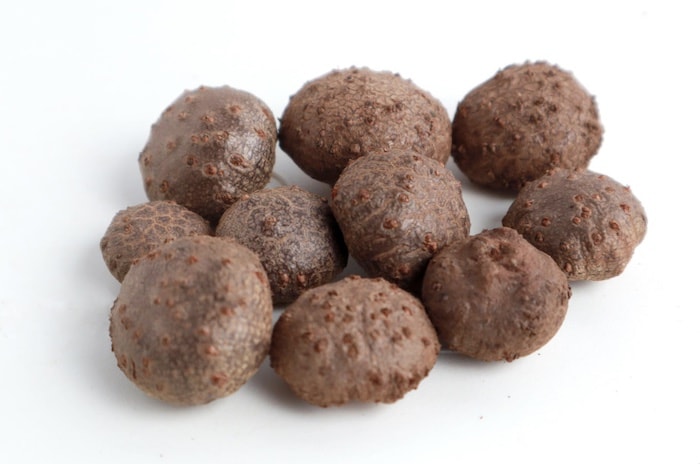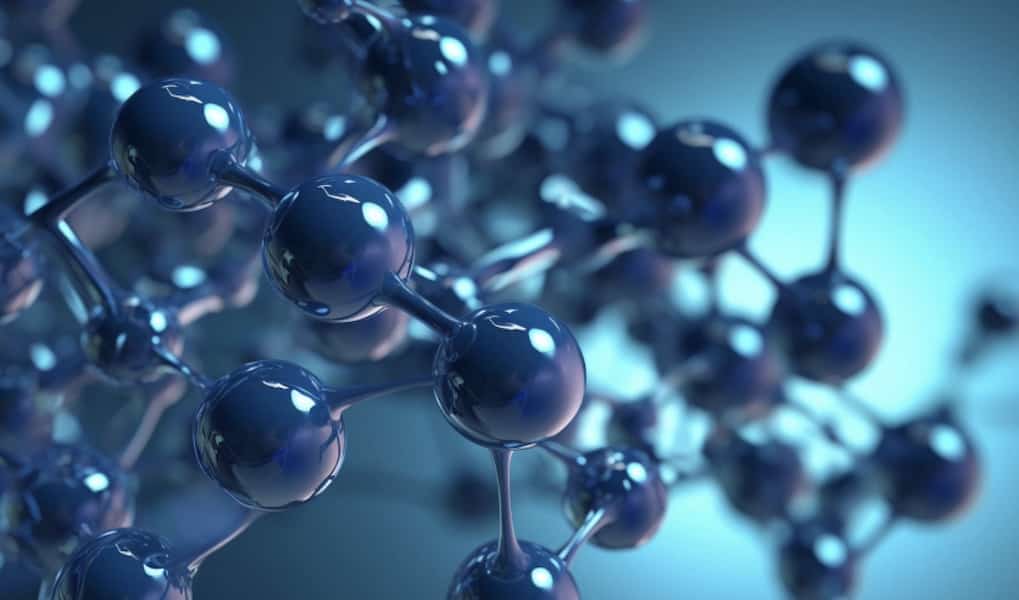Contents
- Glucomannan (Konjac Root)
- Psyllium Seed Husk
- Inulin
- Garcinia Cambogia (Hydroxycitric Acid)
- Forskohlii Root (Forskolin)
- Lotus Leaf (Nuciferine)
- Cissus Repens
- Griffonia Seed
- Guarana Seed
- Chlorogenic Acid
- Ursolic Acid
- Pterostilbene
- NMN (β-Nicotinamide Mononucleotide)
- Berberine
- Metformin
- EGCG (Epigallocatechin Gallate)
- ALCAR (Acetyl-L-Carnitine)
- L-Tyrosine
- L-Ornithine
- Medium Chain Triglyceride (MCT)
Disclaimer. The health blog is not a replacement for medical advice. Medicines may interact with dietary supplements and pre-existing conditions can result in adverse outcomes. Always check with your medical doctor before taking dietary supplements.
1. Glucomannan (Konjac Root)
Glucomannan is a type of dietary fiber that is commonly used to promote weight loss and improve gut health. It is derived from the root of the konjac plant, which is native to Asia. Glucomannan appears to have many potential health benefits, including weight loss, improved gut health, reduced cholesterol levels, improved blood sugar control, and a lowered risk of certain diseases. However, there are some drawbacks to be aware of, including gastrointestinal side effects and potential interference with medication absorption.
Benefits
Weight Loss. Glucomannan is a highly viscous fiber that can absorb water and form a gel-like substance in the stomach. This can help to promote feelings of fullness and reduce hunger, which may lead to a decrease in calorie intake and promote weight loss.
Gut Health. The supplement can help to improve gut health by acting as a prebiotic, feeding the beneficial bacteria in the gut. This can lead to improved digestion, better absorption of nutrients, and a reduced risk of certain gut disorders.
Cholesterol Levels. Glucomannan has been found to help reduce levels of cholesterol for HDL. This may be due to the fiber’s ability to bind to cholesterol and prevent its absorption in the gut.
Blood Sugar Control. It has been found to improve blood sugar control in people with type 2 diabetes by slowing the absorption of glucose in the gut, which may help to prevent blood sugar spikes and promote better insulin sensitivity.
Lowered Disease Risk. The plant extract has been associated with a reduced risk of several diseases, including heart disease, stroke, and some types of cancer.

Konjac root is the raw material for glucomannan
Side-effects
Glucomannan can cause gastrointestinal discomfort, such as bloating and gas, particularly when taken in high doses or without enough water. Moreover, it can interfere with the absorption of certain medications, such as some diabetes medications and blood thinners.
The quality of glucomannan supplements can vary depending on the source and processing method. Choose a great organic source, such as the one from VitaMondo. Supplements can be expensive, particularly if you opt for a high-quality product.
2. Psyllium Seed Husk
Psyllium seed husk is a dietary supplement that is derived from the seeds of the Plantago ovata plant. It is a type of soluble fiber that is often used to improve digestive health, reduce cholesterol levels, lower blood sugar levels, weight loss, and reduce inflammation.
Benefits
Weight Loss. Psyllium seed husk can help promote weight loss by promoting feelings of fullness and reducing appetite. It can also reduce the absorption of calories from food.
Digestive Health. Psyllium seed husk is a natural laxative that can help improve digestive health by promoting regular bowel movements. It can also help relieve symptoms of constipation, diarrhea, and irritable bowel syndrome (IBS).
Cholesterol Levels. Psyllium seed husk has been shown to reduce cholesterol levels by binding to bile acids in the digestive tract and preventing their reabsorption. This can help reduce the risk of heart disease and stroke.
Blood Sugar Levels. Psyllium seed husk can help regulate blood sugar levels by slowing down the absorption of glucose in the small intestine, which can be beneficial for people with diabetes or prediabetes.
Anti-Inflammatory. Psyllium seed husk has anti-inflammatory properties that can help reduce the risk of chronic diseases, such as heart disease, diabetes, and cancer.
Side-effects
Psyllium seed husk can cause digestive discomfort, such as bloating, gas, and abdominal pain, because it absorbs water in the digestive tract and swells, especially if not taken with enough water. However, these symptoms are usually mild. People may be allergic to the seed and get an allergic reaction (itching, hives, difficulty breathing).
Psyllium seed husk can interact with certain medications, such as blood thinners, diabetes-, and cholesterol-lowering medications.
3. Inulin
Inulin is a type of soluble prebiotic fiber found in many plants, such as chicory, artichoke, onions, and garlic. It has become a popular ingredient in many food products due to its potential health benefits, including improved gut health, blood sugar control, weight management, bone health, and reduced inflammation.
Benefits
Weight Loss. Inulin has been shown to promote feelings of fullness and reduce appetite, which can help with weight management. It also reduces the absorption of dietary fat, which can reduce calorie intake and promote weight loss.
Gut Health. Inulin is a prebiotic fiber, which means it feeds the beneficial bacteria in the gut. These bacteria play a critical role in maintaining gut health, and inulin has been shown to increase the abundance of beneficial bacteria, such as Bifidobacteria and Lactobacilli. This can improve gut health and reduce the risk of digestive disorders, such as irritable bowel syndrome (IBS) and inflammatory bowel disease (IBD).
Blood Sugar Control. Inulin has been shown to improve blood sugar control by slowing down the digestion and absorption of carbohydrates. This can help prevent spikes in blood sugar levels and reduce the risk of type 2 diabetes.
Bone Health. Inulin has been shown to improve calcium absorption, which can help improve bone health and reduce the risk of osteoporosis.
Anti-inflammatory. Inulin has been shown to have anti-inflammatory effects, which can help reduce the risk of chronic diseases, such as heart disease, cancer, and Alzheimer’s disease.
Side-effects
Inulin is derived from plants, which means it can cause allergies in rare cases, including itching, swelling, and difficulty breathing. As a high FODMAP food, the fibers can cause digestive discomfort for people with irritable bowel syndrome (IBS). Common symptoms include bloating, gas, and diarrhea. However, these symptoms are usually mild.
Inulin may interfere with the absorption of some medications, such as antibiotics and digoxin. It is a calorie-dense food, which means it can contribute to weight gain if consumed in large amounts.
4. Garcinia Cambogia (Hydroxycitric Acid)
Garcinia cambogia is a tropical fruit also known as the Malabar tamarind. It has gained popularity in recent years due to claims that it can aid weight loss and provide other health benefits. The fruit contains a compound called hydroxycitric acid (HCA) that is believed to be responsible for its potential health effects. However, the use of garcinia cambogia is not without drawbacks. This article will explore the benefits and drawbacks of using garcinia cambogia.
Benefits
Weight Loss. One of the most significant benefits of using garcinia cambogia is weight loss. HCA, the main active ingredient in garcinia cambogia, has been shown to block an enzyme called citrate lyase, which is responsible for converting excess carbohydrates into fat. HCA may also suppress appetite and increase satiety, leading to reduced calorie intake. Several studies have shown that garcinia cambogia supplements can aid weight loss in overweight and obese individuals.
Cholesterol Levels. Garcinia cambogia may also help reduce cholesterol levels. HCA has been shown to inhibit the production of an enzyme called ATP citrate lyase, which is involved in the synthesis of cholesterol. Studies have demonstrated that garcinia cambogia can lower LDL (bad) cholesterol levels and increase HDL (good) cholesterol levels in both animals and humans.
Blood Sugar Levels. Garcinia cambogia may also help regulate blood sugar levels. HCA has been shown to improve glucose metabolism and insulin sensitivity in animal studies. Some human studies have also demonstrated that garcinia cambogia supplements can lower fasting blood sugar levels in individuals with diabetes.
Anti-inflammatory. Garcinia cambogia may have anti-inflammatory properties. HCA has been shown to inhibit the production of inflammatory cytokines, which are involved in the progress of inflammatory diseases such as arthritis, asthma, and inflammatory bowel disease. Some animal studies have demonstrated that garcinia cambogia can reduce inflammation and oxidative stress.

Garcinia cambogia fruit
Other Potential Benefits. Some studies have suggested that garcinia cambogia may have other potential health benefits, including improved digestion, enhanced athletic performance, and reduced stress.
Side-effects
Garcinia cambogia supplements can cause several side effects, including nausea, digestive issues, headaches, and dizziness. These side effects are generally mild and go away on their own after a few days. However, in rare cases, garcinia cambogia supplements can cause more severe side effects, including liver damage.
Garcinia cambogia supplements can interact with certain medications, including antidepressants, statins, and blood thinners. These interactions can cause adverse effects, such as increased bleeding or serotonin syndrome.
The results of studies on the effectiveness of garcinia cambogia for weight loss and other health benefits have been inconsistent. Some studies have shown significant weight loss and improvements in cholesterol and blood sugar levels, while others have not found any significant effects.
5. Forskohlii Root (Forskolin)
Forskohlii (Coleus forskohlii) is a perennial herb native to subtropical regions of Asia and Africa. It has been used for centuries in traditional Ayurvedic medicine to treat a variety of ailments, including asthma, digestive disorders, and cardiovascular diseases. The active compound in Forskohlii root is called forskolin, which has been the subject of numerous scientific studies.
Benefits
Weight Loss. Forskohlii root has been shown to help with weight loss by increasing the breakdown of stored fats in the body. A study published in the Journal of the International Society of Sports Nutrition found that overweight men who took Forskohlii root extract for 12 weeks lost more body fat and increased lean body mass compared to those who took a placebo.
Blood Sugar. Forskohlii root has been shown to help regulate blood sugar levels in people with type 2 diabetes. A study published in the Journal of the International Society of Sports Nutrition found that Forskohlii root extract helped lower fasting blood glucose levels and improved insulin sensitivity in people with type 2 diabetes.
Heart Health. Forskohlii root may also have potential benefits for heart health. It has been shown to help lower blood pressure and improve blood flow to the heart. A study published in the Indian Journal of Pharmacology found that Forskohlii root extract helped lower blood pressure in people with hypertension.
Asthma and Allergies. Forskohlii root has been used for centuries in traditional medicine to treat respiratory ailments, such as asthma and allergies. A study published in the Journal of International Medical Research found that Forskohlii root extract improved lung function and reduced asthma symptoms in people with mild to moderate asthma.
Skin Health. Forskohlii root extract may also have potential benefits for skin health. It has been shown to help reduce the appearance of wrinkles and improve skin texture. A study published in the Journal of Cosmetic Dermatology found that a cream containing Forskohlii root extract helped increase skin firmness and elasticity in women.
Side-effects
Forskohlii root may cause some side effects, such as low blood pressure, flushing, and headaches. It may also interact with certain medications, such as blood thinners and those for high blood pressure.
Forskohlii root. is not recommended for pregnant or breastfeeding women, as there is limited research on their safety.
6. Lotus Leaf (Nuciferine)
Lotus leaf extract is a natural supplement derived from the leaves of the lotus plant, which has been used in traditional medicine for thousands of years in various parts of the world, including China, India, and Egypt. One of the active compounds in lotus leaf extract is nuciferine, which is believed to have various health benefits, including weight loss, antioxidant and anti-inflammatory properties, improved digestion, and mood enhancement.
Benefits
Weight Loss. One of the primary benefits of taking lotus leaf extract with nuciferine is weight loss. Nuciferine has been shown to increase the body’s metabolic rate, which can help burn more calories and fat. It also suppresses the appetite, which reduces the amount of food intake. The lipid alkaloids in the plant may effectively break down the fat of body and prevent fat from being absorbed and accumulated.
Antioxidant. Lotus leaf extract with nuciferine is rich in antioxidants, which protect the body from damage caused by free radicals. Free radicals can damage cells, leading to various health problems, such as cancer, heart disease, and Alzheimer’s disease.
Anti-inflammatory. Nuciferine has been found to have anti-inflammatory properties, which can help reduce inflammation in the body. Chronic inflammation is linked to various health problems, including arthritis, heart disease, and cancer.
Improves Digestion. Lotus leaf extract with nuciferine has been used in traditional medicine to improve digestion. It is believed to help regulate bowel movements and prevent constipation.
Boosting Mood. Nuciferine has been found to have anxiolytic properties, which can help reduce anxiety and boost mood. It is believed to work by modulating the activity of certain neurotransmitters in the brain.
Side-effects
Lotus leaf is generally considered safe when taken in moderate amounts, but some people may experience nausea and diarrhea. The extract may interact with certain medications, such as blood thinners, diabetes medications, and antidepressants.
7. Cissus Repens
Cissus repens is a type of plant that is used in traditional medicine to treat a variety of ailments. In recent years, it has gained popularity as a dietary supplement for its potential health benefits, including its effects on bone health, weight loss, wound healing, inflammation, and cancer prevention.
Benefits
Weight Loss. Cissus repens may have benefits for weight loss. It has been shown to reduce body weight and body fat in animal studies. It may also help improve insulin sensitivity, which can help reduce the risk of diabetes.
Bone Health. Cissus repens has been studied for its potential to improve bone health. It may help increase bone density, reduce the risk of fractures, and improve bone healing. It may also have benefits for joint health, including reducing joint pain and inflammation.
Anti-inflammatory. Cissus repens has been shown to have anti-inflammatory properties. It may help reduce inflammation throughout the body, which can have benefits for a variety of health conditions, including arthritis and cardiovascular disease.
Wound Healing. Cissus repens has been used in traditional medicine to treat wounds and other skin conditions. It may have benefits for wound healing, including reducing inflammation and promoting the growth of new tissue.
Anti-cancer. Cissus repens has been studied for its potential to inhibit the growth of cancer cells. It may have benefits for preventing or treating certain types of cancer, including breast and prostate cancer.

Cissus Repens Green Leafs
Side-effects
There have been reports of side-effects associated with the use of Cissus repens at higher doses, such as gastrointestinal upset, headache, and insomnia. It may interact with certain medications, including blood thinners and medications for diabetes. Cissus repens supplements are not recommended for pregnant or breastfeeding women, as there is limited research on their safety.
8. Griffonia Seed
Griffonia seed extract is a popular herbal supplement that is extracted from the seeds of the Griffonia simplicifolia plant. It is commonly used to promote sleep, reduce anxiety and depression, aid in weight loss, reduce inflammation, and improve cognitive function.
Benefits
Weight Loss. Griffonia seed has been found to aid in weight loss by suppressing appetite and reducing cravings. This is because it can increase the levels of the hormone leptin, which signals the brain to feel full.
Griffonia contains 5-HTP (5-hydroxytryptophan), a precursor to serotonin, which is a neurotransmitter that plays a role in regulating mood, appetite, and seep. Serotonin is also involved in regulating food intake and cravings, and low levels of serotonin have been associated with overeating and weight gain. By increasing serotonin levels, Griffonia Seed Extract may help to reduce food cravings and promote satiety, which can aid in weight loss efforts.
One study published in the Journal of Neural Transmission found that participants who took Griffonia Seed Extract experienced significant reductions in body weight, BMI, and waist circumference after 12 weeks of supplementation. The researchers suggested that these effects were due to the supplement’s ability to increase serotonin levels, which led to reduced food intake and increased satiety. Another study published in the International Journal of Medical Sciences found that Griffonia Seed Extract supplementation led to significant reductions in body weight, BMI, and body fat percentage compared to a placebo group.
Anti-inflammatory. Griffonia Seed has anti-inflammatory properties, which can help reduce inflammation in the body. This can be beneficial for people with inflammatory conditions such as arthritis and asthma.
Cognitive function. Griffonia Seed has been found to improve cognitive function by increasing serotonin levels in the brain, which can improve memory, concentration, and overall cognitive function.
Reduced Anxiety and Depression. Griffonia Seed has been shown to be effective in reducing symptoms of anxiety and depression. This is because it increases the levels of serotonin in the brain, which can improve mood and reduce anxiety.
Improved Sleep. Griffonia Seed is known for its ability to promote restful sleep due to 5-HTP, a natural compound that is converted into serotonin in the brain. Serotonin is a neurotransmitter that plays a key role in regulating sleep and mood.
Side-effects
Griffonia seed extract is generally safe when taken in recommended doses, but it can cause side-effects in some people, such as nausea and diarrhea. In rare cases it can cause a condition called eosinophilia-myalgia syndrome (EMS), which can be a serious condition that causes muscle pain, weakness, and nerve damage. The supplement can interact with certain medications, such as antidepressants and medications for Parkinson’s disease. It may not be suitable for people with liver or kidney disease.
Griffonia Seed supplements are not recommended for pregnant or breastfeeding women, as there is limited research on their safety.
9. Guarana Seed
Guarana is a popular dietary supplement that is derived from the seeds of the guarana plant, which is native to the Amazon region. It is known for its high caffeine content and energy-boosting properties. It is also believed to offer various other health benefits, including improved cognitive function, weight loss, and athletic performance.
Benefits
Weight Loss. Guarana extract is often included in weight loss supplements because it is believed to help suppress appetite and increase metabolism. Some studies have suggested that it may also help promote fat burning and reduce body weight.
Athletic Performance. The caffeine in guarana has also been shown to improve athletic performance by increasing endurance and reducing fatigue. It may also help improve reaction time and coordination.
Alertness and Energy. The supplement is known for its high caffeine content, which can help increase energy levels and promote alertness. It is often used as a natural alternative to coffee and other caffeinated beverages.
Cognitive Function. The caffeine in guarana extract has been shown to improve cognitive function, including memory, attention, and reaction time. It may also help reduce mental fatigue and improve mood.
Side-effects
Like any supplement, guarana extract can cause side effects in some people. Common side effects include anxiety, nervousness, restlessness, insomnia, and stomach upset. It can also increase heart rate and blood pressure in some people. Because guarana extract is high in caffeine, it can lead to caffeine addiction in some people. Regular use of high doses of guarana extract can lead to withdrawal symptoms if discontinued.
Guarana extract can interact with certain medications, including blood thinners, stimulants, and some antidepressants. If you are taking any medications, it is important to talk to your healthcare provider before starting a guarana extract supplement, especially if you have a history of heart disease or other medical conditions.
10. Chlorogenic Acid
Chlorogenic acid is a naturally occurring compound found in various plant foods, particularly coffee beans and some fruits such as apples, berries, and plums. This compound is popular as a dietary supplement and has been associated with various health benefits, but also has some potential drawbacks to consider.
In conclusion, chlorogenic acid can offer many potential health benefits, particularly for weight loss, blood sugar control, cardiovascular health, anti-inflammatory effects, and antioxidant effects. However, it is important to be aware of the potential drawbacks associated with its use, including side effects, interaction with medications, quality control, limited research, and the source of chlorogenic acid. As with any supplement or medication, it is important to consult with a healthcare provider before starting to take chlorogenic acid supplements to determine whether they are safe and appropriate for you.
Benefits
Weight Loss. Chlorogenic acid has been shown to have an effect on body weight and fat mass, particularly in overweight and obese individuals. This compound may help to reduce the absorption of carbohydrates, increase metabolism, and reduce the accumulation of fat in the body.
Blood Sugar Control. Chlorogenic acid may help to improve blood sugar control by reducing the absorption of glucose in the intestines and increasing insulin sensitivity. This effect may be particularly beneficial for individuals with type 2 diabetes.
Cardiovascular Health. Studies suggest that chlorogenic acid may help to lower blood pressure and reduce cholesterol levels, which can help to improve overall cardiovascular health and reduce the risk of heart disease.
Anti-inflammatory. Chlorogenic acid has been shown to have anti-inflammatory properties, which may help to reduce inflammation in the body and reduce the risk of chronic diseases such as cancer, arthritis, and Alzheimer’s disease.
Antioxidant. Chlorogenic acid is a powerful antioxidant that can help to protect the body against oxidative stress and damage from free radicals. This effect may help to reduce the risk of chronic diseases and improve overall health and wellbeing.
Side-effects
Some people may experience side-effects when taking chlorogenic acid supplements, particularly gastrointestinal symptoms such as nausea, diarrhea, and abdominal pain. These side effects are usually mild. It may interact with certain medications, such as those for diabetes.
The quality and purity of chlorogenic acid supplements can vary widely between different brands and manufacturers, so it is important to choose a certified product, such as the organic extract from VitaMondo.
11. Ursolic acid
Ursolic acid is a natural compound found in a variety of plants, including apple peels, rosemary, and holy basil. It has been researched for its potential benefits on health, fitness, muscle building, fat loss, and longevity. In particular, it possesses anti-inflammatory, antioxidant, anti-cancer, anti-obesity, anti-diabetic, and anti-aging effects.
Benefits
Weight Loss & Anti-Obesity. Ursolic acid may help with weight loss and prevent obesity. It has been shown to decrease adipogenesis, the process by which new fat cells are formed, and increase lipolysis, the breakdown of fat cells.
One study published in the journal Nutrition & Metabolism found that supplementing with ursolic acid for 12 weeks reduced body fat and improved markers of metabolic health in overweight and obese individuals. The researchers suggested that these effects may be due to the ability to increase energy expenditure and promote the browning of white fat.
Blood Sugar Levels. Ursolic acid can improve glucose tolerance and insulin sensitivity, making it a promising natural compound for managing type 2 diabetes.
Fitness and Exercise. One study published in the journal Metabolism found that supplementing with ursolic acid for eight weeks increased muscle mass and strength in healthy men. The researchers attributed these effects to the ability of ursolic acid to enhance insulin signaling and reduce muscle wasting. Another study published in the Journal of Medicinal Food showed that ursolic acid supplementation in mice improved exercise endurance and increased levels of proteins associated with muscle growth.
Other research has investigated the potential benefits of ursolic acid for exercise performance. One study published in the Journal of Ethnopharmacology showed that supplementation with ursolic acid improved exercise performance and reduced muscle damage in mice. The researchers suggested that these effects may be due to the acid’s ability to reduce inflammation and oxidative stress.

Rosemary contains small amounts of ursolic acid
Anti-inflammatory. Ursolic acid has been shown to possess anti-inflammatory properties. It can reduce the production of inflammatory cytokines and alleviate inflammation in the body. Chronic inflammation is associated with numerous diseases, including cancer, diabetes, and cardiovascular diseases.
Antioxidant. Ursolic acid has potent antioxidant properties, which can help protect the body from oxidative stress. It scavenges free radicals and prevents cellular damage caused by them.
Anticancer. Studies have suggested that Ursolic acid may possess anti-cancer properties. It can inhibit the growth of cancer cells and induce apoptosis, a process by which the body eliminates damaged or cancerous cells.
Anti-aging. Ursolic acid has been shown to increase the lifespan of fruit flies and mice. It can also protect against age-related decline in cognitive function and muscle mass.
Side-effects
While Ursolic acid has been studied for its potential benefits, there is still limited research on its safety and efficacy in humans. More research is needed to determine its long-term effects and optimal dosage.
Some people may experience side effects when taking Ursolic acid, including digestive issues, headache, and dizziness. However, these side effects are generally mild and rare.
Ursolic acid may interact with certain medications, including blood thinners, diabetes medications, and cholesterol-lowering drugs. It is important to consult with a healthcare professional before taking Ursolic acid if you are on any medications.
Ursolic acid is not widely available as a supplement and can be expensive.
12. Pterostilbene
Pterostilbene is a naturally occurring polyphenol in some plants, such as blueberries. It is a stilbenoid like resveratrol, but it has a higher bioavailability and adsorption rate. The general benefits according to research is that it is anti-inflammatory, antioxidant, blood-sugar-balancing, anticarcinogenic, pain-relieving, cardiovascular-/neurological- protective properties.
Benefits
Weight Loss. The body has a form of fat called brown adipose tissue, which is metabolically active and burns calories to produce heat. By contrast, the white adipose tissue is the fat tissue linked to weight growth and obesity. It has been demonstrated that pterostilbene increases the caloric intake of brown adipose tissue in animal models. It has been shown that pterostilbene helps the white adipose tissue to act more like brown adipose tissue and burn extra calories.
Pterostilbene has been found to prevent the growth of new fat cells and the adsorption of fat into white adipose tissue. Inflammation is also known to rise with obesity. Inflammatory signaling molecules are produced by fat cells, and this results in excessive inflammation throughout the body. Pterostilbene aids in preventing this inflammatory signaling from fat cells because of its anti-inflammatory properties.
The advantages for gut flora also seem to apply to obesity. It is overall recognized that some alterations in gut flora may promote weight gain. The effects of pterostilbene on gut flora restoration appear to contribute to the management of obesity. Animal experiments shows to rectify the gut flora abnormalities prevalent in overweight animals.
Antioxidant. Pterostilbene has been demonstrated to aid in lowering free radical damage, just like vitamin C and vitamin E. According to the published studies, pterostilbene has direct antioxidant actions and increases the body’s natural antioxidant defenses and enzymes. Several of its prospective health benefits are thought to be connected to its antioxidant properties.
Anti-Inflammatory. Numerous chronic diseases have been linked to an increase in inflammatory activity within the body. A signaling chemical called nitric oxide can contribute to immunological responses by inducing inflammation. Aspirin and ibuprofen both suppress the inflammatory signaling molecule cyclooxygenase (COX). The anti-inflammatory effect of pterostilbene appears to block both of these signaling molecules. Multiple chronic disorders have been linked to elevated levels of these enzymes.
Neuroprotective. The prevalence of Alzheimer’s disease has been rising as the life-span increase. Currently, Alzheimer’s disease causes a slow, irreversible deterioration that eventually results in memory loss, disability, and death, even with routine therapy. Unfortunately, there are no approved medications that can change the course of a disease.
A new strategy is using supplements, e.g. acetyl-L-carnitine, omega-3, citicoline, and pterostilbene in the prevention or treatment. In one study, involving older rats found pterostilbene to be effective in reversing age-related cognitive deterioration, such as memory gains.
One crucial neurotransmitter that declines with dementia is acetylcholine. However, studies have found pterostilbene slows down the metabolism and breakdown of acetylcholine and prevents the deterioration. These results have been replicated by several animal research using various models, which have revealed enhanced memory function, elevated acetylcholine levels, and reduced brain inflammation.
Blood Sugar. Several organic substances seem to be able to regulate blood sugar levels and assist in the treatment of diabetes. Among other natural substances, cinnamon, berberine, and hibiscus have all demonstrated potential advantages. Recent research on pterostilbene shows great promise for assisting with blood sugar control and diabetes problems.
Animal studies have found support the benefits on diabetes from pterostilbene. In some of the earlier studies, rodents with diabetes that were given pterostilbene exhibited blood sugar-lowering effects similar to that of the diabetic drug metformin.
Pterostilbene additionally has a number of preventive benefits for diabetes. It prevents kidney damage, which is a major complication in diabetes. Pterostilbene applied topically can speed up the duration of burn healing. Likewise, it has been demonstrated that it can help prevent hearing loss in diabetic rodents by reducing free-radical damage.
Pain-relief. Large human clinical trials are lacking, but the anti-inflammatory properties suggest it could function as a pain relief. A study on rodents with arthritis demonstrated decreased edema and inflammation. Pterostilbene also altered the composition of the gut flora, reducing harmful bacteria in the digestive tract, which could aid in reducing inflammation. Another rodent study showed improvement in rheumatoid arthritis when pterostilbene was paired with physical activity.
Heart Health. Pterostilbene also seems to aid in heart disease prevention through a number of the previously mentioned mechanisms, such as antioxidant and anti-inflammatory actions. Again, research has shown that pterostilbene protects the heart from harm or enhances cardiac function, even in the midst of acute heart failure or following a heart attack. Pterostilbene may have potential blood pressure-lowering effects, according to preliminary human experiments. Pterostilbene may exhibit considerable heart advantages with further human clinical trials, just as a variety of other natural substances, such as CoQ10, carnitine, and garlic extract.
Side-effects
Pterostilbene is regarded as safe up to levels of 250 mg per day. Although, some people may notice an increase in LDL cholesterol. General caution is advised for doses higher than what is typically consumed through diet.
13. NMN (β-Nicotinamide Mononucleotide)
Nicotinamide mononucleotide (NMN, β-NMN) is a nucleotide composed of vitamin B3 (nicotinamide), a sugar molecule (ribose), and a phosphate molecule. Like nicotinamide riboside, NMN is a derivative of niacin, and humans have enzymes that can use NMN to generate nicotinamide adenine dinucleotide (NADH). In mice, NMN enters cells via the small intestines and within 10 minutes convert to NAD+ through the Slc12a8 NMN transporter.
NAD+ levels decline with age, and this decline is thought to be associated with accelerated physical decline and the onset of age-related diseases like Alzheimer’s. Animal studies have shown that supplementing with NAD+ precursors NMN and NR restores NAD+ levels and prevents age-related physical decline. NAD+ is a compound found in every cell in your body and involved in many critical processes, including energy metabolism, DNA repair, and gene expression. NMN supplementation in turn has prevented age-associated genetic changes and improved energy metabolism, physical activity, and insulin sensitivity.
Because NADH is a cofactor for processes inside mitochondria, for sirtuins, and for PARP, NMN has been studied in animal models as a potential neuroprotective and anti-aging agent.
NMN can be given safely to mice and is found naturally in a number of foods, including broccoli, cabbage, cucumber, edamame and avocado. The new study shows that when NMN is dissolved in drinking water and given to mice, it appears in the bloodstream in less than three minutes. Importantly, the researchers also found that NMN in the blood is quickly converted to NAD in multiple tissues.
In skeletal muscle NMN administration helps energy metabolism by improving the function of mitochondria, which operate as cellular power plants. They also found that mice given NMN gained less weight with aging even as they consumed more food, likely because their boosted metabolism generated more energy for physical activity.
Benefits
Weight Loss. Beta NMN (beta-nicotinamide mononucleotide) is a molecule that is involved in the production of NAD+ (nicotinamide adenine dinucleotide), which is a coenzyme that plays a role in energy metabolism and cellular function. NAD+ levels decline with age, which has been linked to age-related metabolic dysfunction and weight gain. Beta NMN supplementation has been studied for its potential to increase NAD+ levels and improve metabolic health.
One study published in the journal Cell Metabolism found that beta NMN supplementation led to significant improvements in glucose metabolism, insulin sensitivity, and energy expenditure in mice fed a high-fat diet. The researchers suggested that these effects were due to beta NMN’s ability to increase NAD+ levels, which led to improvements in mitochondrial function and energy metabolism.
Another study published in the journal Nature Communications found that beta NMN supplementation led to significant reductions in body weight, fat mass, and liver fat in mice fed a high-fat diet. The researchers suggested that these effects were due to beta NMN’s ability to increase NAD+ levels, which led to improvements in energy expenditure and fat metabolism.
Muscle Growth. One study published found that people who consumed a NMN after resistance training experienced 22 percent more muscle protein synthesis than a control group. NMN was also effective at reducing the breakdown of muscle in the body in humans, for example from side effect of chronic conditions like cancer or normal part of the aging process. Recent research on amateur runners showed that an increased exercise-induced human aerobic capacity when using NMN.
Longevity and Aging. There are several studies that show lifespan is extended in mice, while longer studies on humans are ongoing.NMN is quickly absorbed and converted to NAD when administered orally, which several studies have shown increases NAD levels, decreases inflammation in aging adipose tissue, increases insulin secretion and action, enhances mitochondrial function, enhances brain neuronal function, and more.

Natural NMN (nicotinamide mononucleotide) molecule
Metabolic Diseases. Animal research have revealed promising findings concerning the function of NAD boosters in reversing the effects of high-fat diets, reducing body weight, and enhancing energy levels. According to the findings of a small clinical study, women with prediabetes who took NMN for 10 weeks had better muscle glucose metabolism.
Energy and Stamina. Although there isn’t much clinical proof for this advantage, studies on mice reveal that NMN can boost stamina and endurance by up to 80%.
Cognitive Function. Studies on rodents back up the idea that NMN enhances a number of crucial mental processes, including cognition and memory in models of Alzheimer’s disease.
Side-effects
There are no documented negative effects of NMN. Numerous studies have demonstrated that even at extremely large doses of NMN administered to mice there are no harmful or adverse consequences. According to human clinical toxicity study at Keio University in Japan, NMN can be supplied safely and is efficiently digested in the body.
14. Berberine
Berberine is a natural compound found in several plants, such as Berberis vulgaris, Berberis aristata, and Coptis chinensis. Berberine has been used in traditional Chinese and Ayurvedic medicine for thousands of years for its medicinal properties. In recent years, it has gained attention in the Western world for its potential health benefits, such as regulating blood sugar and cholesterol levels, reducing inflammation, and aiding in weight loss.
Benefits
Weight Loss. Berberine has been found to aid in weight loss by increasing metabolism, reducing fat storage, and decreasing insulin resistance. It has also been shown to reduce appetite and food intake.
Blood Sugar. Berberine has been found to be effective in reducing blood sugar levels in people with type 2 diabetes. It works by activating an enzyme called AMPK, which helps regulate glucose uptake in the body. Studies have shown that berberine can reduce fasting blood sugar levels, HbA1c levels, and improve insulin sensitivity.
Cholesterol. High cholesterol levels are a risk factor for heart disease. Berberine has been found to reduce LDL cholesterol and triglyceride levels, while increasing HDL cholesterol levels. This makes it a promising natural alternative to statin drugs.
Anti-inflammatory. Berberine has been shown to have anti-inflammatory properties, which may be beneficial in treating a variety of conditions such as arthritis, Alzheimer’s disease, and cancer. It works by reducing the production of inflammatory cytokines, which can lead to chronic inflammation.
Antimicrobial. Berberine has antimicrobial properties, making it effective in treating various infections caused by bacteria, viruses, and fungi. It has been found to be effective in treating diarrhea caused by E. coli, cholera, and other bacterial infections. It has also been shown to be effective in treating fungal infections such as candida.

Berberine Powder Bulk (Berberis Vulgaris)
Side-effects
Berberine can cause side effects in some people, such as nausea, diarrhea, stomach pain, and constipation. It can also cause low blood pressure and heart palpitations in people with pre-existing heart conditions.
Berberine can interact with certain medications, such as blood thinners, statins, and antidepressants. It can also increase the effects of drugs that lower blood sugar levels, such as metformin.
There is limited research on the safety of berberine during pregnancy and breastfeeding. Therefore, it is not recommended for use during these periods.
15. Metformin
Metformin is a biguanide antihyperglycemic agent that was discovered in 1922. The compound originates from the French lilac or goat’s rue (Galega officinalis), which in turn had been in use in folk medicine for centuries. In the 1950s the French physician Jean Sterne began the study in humans.
Today it is common medicine worldwide that is available by prescription in Europe and North America, and over the counter in Southeast Asia. It has been in use for decades been used as the first-line treatment for type 2 diabetes. More recently it has been studied for its potential for other conditions, such as longevity, polycystic ovary syndrome (PCOS), obesity, and cancer.
Benefits
Weight Loss. Metformin has been shown to help people lose weight, especially in those with type 2 diabetes who are overweight or obese. It works by reducing appetite, increasing satiety, and reducing the absorption of calories from food. Studies have shown that metformin can lead to a modest reduction in body weight, which can have significant health benefits.
Blood Sugar. Metformin is used to lower blood sugar levels in people with type 2 diabetes. It works by reducing the amount of glucose produced by the liver and improving the body’s ability to use insulin, which may help with diabetes side-effects, such as nerve damage, kidney damage, and eye problems.
PCOS Treatment. Metformin is also used to treat PCOS, a condition that affects women’s hormone levels, leading to irregular periods, acne, and excess hair growth. Metformin helps to regulate the levels of insulin in the body, which can improve symptoms of PCOS, such as irregular periods and fertility problems.
Cardiovascular Health. Metformin has been shown to improve cardiovascular health by reducing the risk of heart attacks and strokes in people with type 2 diabetes. It also helps to reduce inflammation, which can be a risk factor for cardiovascular disease.
Anticancer. There is evidence to suggest that metformin may help to prevent certain types of cancer. It works by reducing the levels of insulin and glucose in the body, which can inhibit the growth of cancer cells. Some studies have shown that metformin may reduce the risk of breast, colon, and prostate cancer.

French Lilac gives us the source material for metformin
Side-effects
Metformin can cause gastrointestinal side effects, such as nausea, diarrhea, and abdominal discomfort. These side effects usually go away on their own. It can cause a deficiency in vitamin B12, which can lead to anemia, nerve damage, and other health problems.
In rare cases, metformin can cause a serious condition called lactic acidosis, which is a buildup of lactic acid in the blood. This can be life-threatening and requires immediate medical attention. Symptoms of lactic acidosis include weakness, muscle pain, and difficulty breathing.
Metformin can cause kidney problems in people with pre-existing kidney disease or other conditions that can affect kidney function, so it is important for people to have their kidney function checked regularly. It can also interact with other medications, such as certain antibiotics and blood pressure medications.
16. EGCG (Epigallocatechin Gallate)
Epigallocatechin gallate (EGCG) is a type of catechin, a class of natural flavonoids found in various plants, but most abundant in green tea, matcha tea and tea extracts. EGCG is a powerful antioxidant and has been the subject of numerous studies investigating its potential health benefits. and it is considered safe when consumed in moderation.
Benefits
Weight loss. EGCG has been studied for its potential to aid in weight loss. Studies have suggested that EGCG may help boost metabolism and increase fat oxidation, which may contribute to weight loss. EGCG may also help reduce appetite and increase satiety, leading to lower caloric intake.
Antioxidant. EGCG has strong antioxidant properties and can protect the body from oxidative stress, which is linked to numerous health conditions, including cancer, heart disease, and cognitive decline. EGCG’s antioxidant activity may also help reduce inflammation in the body and prevent cellular damage.
Cardiovascular system. EGCG has been found to have cardioprotective effects, including improving blood lipid profiles by lowering total cholesterol, triglycerides, and LDL cholesterol. EGCG has also been shown to reduce blood pressure and improve endothelial function, which is important for healthy blood flow.
Anticancer. EGCG has been studied for its potential to prevent and treat cancer. It may help inhibit the growth of cancer cells and cause apoptosis (cell death) in cancer cells. EGCG has been shown to have promising results in studies on breast, prostate, colon, and lung cancers.
Cognitive function. EGCG has been found to have neuroprotective effects, which may contribute to improved cognitive function and a reduced risk of age-related cognitive decline. EGCG has been studied for its potential to help prevent neurodegenerative diseases such as Alzheimer’s and Parkinson’s.
Side-effects
While EGCG has many potential health benefits, its bioavailability is limited as it is poorly absorbed. This means that consuming large amounts of EGCG may not necessarily result in increased levels in the body. It has been found to interact with certain medications, including blood thinners and chemotherapy drugs.
EGCG is most abundant in green tea, which also contains caffeine and high levels of caffeine intake can cause side effects such as anxiety, insomnia, and increased heart rate.

Tea leaves is a key source for ECGC
17. ALCAR (Acetyl-L-Carnitine)
Acetyl-L-Carnitine is similar to the non-essential amino acid L-Carnitine, albeit with a slightly different effect. Acetyl-L-carnitine assists the body in a number of functions, from producing energy, muscle movement, and many other body processes, such the heart and brain function. Acetyl-L-carnitine has been treated such that it may easily cross the blood-brain barrier and is believed to improve brain health and memory.
For a range of illnesses, including Alzheimer’s disease, age-related memory loss, depression, thinking issues linked to alcoholism, thinking issues linked to Lyme disease, and thinking issues linked to very bad liver function, people take acetyl-L-carnitine orally (hepatic encephalopathy). It is also used to treat other conditions such alcohol withdrawal, Down syndrome, bipolar disorder, inadequate brain blood flow following a stroke, cataracts, nerve pain from diabetes, nerve pain from medications used to treat AIDS or cancer, sciatic nerve pain, fibromyalgia, and facial paralysis.
Benefits
Weight Loss. According to several research, taking supplements can actually be a successful approach to accelerate weight loss when used in conjunction with a healthy diet and regular exercise. A study from Iran that examined the findings of nine different trials indicated that adding carnitine to the diet dramatically increased weight reduction and reduced body mass index when compared to a control group. However, the effects of L-carnitine on weight loss may differ, and other research have produced contradictory findings.
For instance, in an Australian trial that was published in the International Journal of Sports Nutrition and Exercise Metabolism, 36 obese women underwent eight weeks of aerobic exercise while taking either L-carnitine or a placebo. Researchers came to the conclusion that L-carnitine had no effect on either total body mass or fat mass at the end of the investigation. L-carnitine may be effective for certain people, but it is not a panacea. For best results, combine it with regular exercise and a balanced diet.
Burning Fats Faster. This amino acid not only speeds up weight reduction, but also speeds up fat burning. Overweight subjects in a German study were given a conventional diet with or without the addition of L-carnitine. L-carnitine was discovered to drastically speed up the breakdown of fat after just 10 days. Another study found that raising the amount of carnitine in muscles helped prevent fat growth by raising fat burning and energy expenditure during physical activity, according to a report in the Journal of Physiology.
Increased Endurance. L-carnitine is a crucial component of energy generation, thus many people utilize it to improve energy levels and endurance during bodybuilding and athletic competition. Giving professional soccer players three to four grams of L-carnitine before training was found to increase the amount of time it took for them to become exhausted in a study from Turkey that was published in the Journal of Strength and Conditioning Research. Likewise, rats were given L-carnitine in an animal study from India that was published in the journal Wilderness & Environmental Medicine and shown an increase in exercise endurance. For this reason, supplementing with this amino acid may especially benefit endurance athletes, such as long-distance runners, swimmers or cyclists.
Reduced Muscle Injury. This amino acid is a helpful supplement for athletes trying to avoid and mitigate muscle injury in addition to boosting endurance and speeding up weight reduction. In a study from 2014 that was printed in the Asian Journal of Sports Medicine, 21 male athletes were administered L-carnitine or a placebo every day for two weeks before an athletic test. L-carnitine users were discovered to have lower levels of certain indicators that point to muscle injury than the control group.
Cognitive Function. L-carnitine benefits both your body and mind. It’s not simply helpful for your body. In fact, promising research suggests that it may have a positive effect on cognition and brain function. In one Italian study, the University of Catania examined the impact of daily L-carnitine supplementation on participants’ levels of physical and mental weariness. The results were published in the American Journal of Clinical Nutrition. It was discovered to aid lessen fatigue and enhance cognitive function in addition to reducing total body fat mass and increasing muscular mass. Even further research has shown that acetyl-L-carnitine, a different type of L-carnitine, may assist patients with Alzheimer’s disease reverse cognitive loss and restore memory.
Blood Sugar. Carnitine supplementation may help to maintain normal blood sugar levels and combat insulin resistance, according to some encouraging findings. The hormone insulin is in charge of delivering bloodstream sugar to cells where it can be used as fuel. Insulin resistance, which reduces its efficiency and causes high blood sugar, can be brought on by an excess of insulin. A study from Rome that was published in the Journal of the American College of Nutrition demonstrated that giving persons with diabetes L-carnitine injections boosted their blood sugar uptake and enhanced their insulin sensitivity. By combining L-carnitine with calorie restriction, a 2010 small study at Sapienza University in Rome discovered that insulin resistance was decreased and insulin sensitivity was elevated.
Male Infertility. When combined with L-carnitine, acetyl-L-carnitine appears to improve sperm motility, which may increase the likelihood of conception in infertile men. Additionally, supplementing with acetyl-L-carnitine and L-carnitine after receiving therapy with NSAIDs appears to increase sperm count and sperm motility in males whose infertility is brought on by enlargement of the prostate gland, seminal vesicles, and epididymis. Additionally, taking acetyl-L-carnitine, L-carnitine, L-arginine, and Panax ginseng together appears to boost sperm mobility in males who are infertile because their sperm movement is reduced. In men who are infertile due to swollen prostates brought on by Chlamydia infection, it may also enhance sperm motility and count.
Aging (Memory, Tiredness). In older persons with some memory loss, using acetyl-L-carnitine seems to improve memory and mental performance. Taking acetyl-L-carnitine helps older adults feel less physically and mentally exhausted. Additionally, it tends to lessen post-exercise fatigue. Acetyl-L-carnitine and propionyl-L-carnitine taken orally may alleviate symptoms brought on by low levels of male hormones. Similar to how the male hormone testosterone works, this combination, when taken for six months, seems to treat sexual dysfunction, depression, and exhaustion.
Alzheimer’s Disease. In certain Alzheimer’s patients, acetyl-L-carnitine may enhance memory, several measures of mental function, and behavior. It may also delay the rate at which the illness progresses. Those with early-onset Alzheimer’s disease who are younger than 66 and have a quicker pace of disease development and mental impairment are more likely to benefit from it.
Alcohol Withdrawal. Acetyl-L-carnitine reduces withdrawal symptoms and lengthens the period between drinking alcohol when given intravenously (via IV) for 10 days and then orally for 80 days. However, the first week is when symptoms start to improve the most. Therefore, it is unclear whether oral acetyl-L-carnitine supplementation after IV therapy provides any further benefits.
Side-effects
When taken orally, acetyl-L-carnitine is probably safe for the majority of adults. Side effects including nausea and upset stomach could make bipolar disorder symptoms worse in persons who are presently in remission. Additionally, it might make symptoms worse for certain persons who have taxanes-related nerve discomfort after chemotherapy. It has been suggested that acetyl-L-carnitine may interfere with thyroid hormone. L-carnitine, which is related to acetyl-L-carnitine and has been used by people with a history of seizures, has been associated with an increase in the frequency or intensity of seizures.
18. L-Tyrosine
L-Tyrosine is necessary for creating the neurotransmitters epinephrine (adrenaline), norepinephrine, dopamine, and thyroid hormone all depend on the non-essential amino acid l-tyrosine. Moreover, L-Tyrosine supports healthy glandular function and stress response.
L-tyrosine is frequently used to enhance memory, focus, and alertness under pressure. The body uses tyrosine to make chemical messengers that are involved in conditions involving the brain, such as mental alertness. L-tyrosine advantages may include preventing weight gain, depression, weariness, and impaired cognitive function overall.
Benefits
Weight Loss. No particular research have been done, according to University of Michigan Medicine, to prove that L-tyrosine helps with weight loss. However, there is some evidence that it may aid in fat loss in overweight individuals when combined with other naturally occurring fat-burning chemicals like cayenne, green tea, and caffeine, but only modestly. In a 2007 study, overweight persons who also took tyrosine, capsaicin, catechins, and caffeine saw a very slight weight loss of about 0.9 kg.
Cognitive Function and Memory. Tyrosine supplements affect mental performance under pressure, according to research. These include stress caused by the cold or stress caused by noise.
Tyrosine supplements have been shown to enhance memory under pressure. These include cold-induced stress or multi-tasking. One study found that tyrosine significantly enhanced accuracy and decreased frequency of list retrieval on the working memory task during the multiple task battery.
Improved Alertness. People who have missed a night of sleep can stay alert for an additional three hours by taking tyrosine. Additionally, preliminary research suggests that tyrosine improves memory and thinking in those who are sleep-deprived. There is some proof that increasing your tyrosine intake can enhance your mood, alertness, stress-coping skills, and general cognitive performance. According to one study, it is helpful when soldiers are subjected to physical stressors, such as those that are relevant to the military, such exposure to cold stress, high-altitude stress, or prolonged wakefulness.
Supports Treatment for Depression. Tyrosine affects dopamine and adrenaline levels, which control your reward and pleasure centers and your “fight-or-flight response” under stress, respectively. Catecholamines are released more readily in stressful situations, which may lower their concentrations. L-Tyrosine can aid in restoring the levels. People that are under a lot of stress or who are depressed may find that increasing their intake of this amino acid is beneficial because symptoms like irritability, weariness, and moodiness tend to worsen when dopamine and norepinephrine levels fall.
Withdrawal Treatments. Dopamine fluctuations have been shown to make people more susceptible to addictions. Low levels might make it difficult to start or finish work, cause sadness, impair focus, sap your energy, and make you unmotivated. Alcohol, drug usage, smoking, gambling, and overeating are examples of addictive habits. One study shows that tyrosine, when combined with the medicine naltrexone, may help manage the symptoms of alcohol and heroin withdrawal as well as in reducing alcohol consumption.
Tyrosine, 5-hydroxytryptophan (HTP), phosphatidylcholine, and L-glutamine appear to have the greatest positive benefits on mood and sleep in individuals addicted to heroin and alcohol, possibly because they assist balancing catecholamine levels.
Side-effects
When used by adults in a supporting treatment in amounts up to 150 mg/kg per day for up to 3 months, tyrosine appears safe. Some people report having adverse symptoms like heartburn, fatigue, nausea, and headaches. The supplementation may lead to an excessive rise in thyroxine levels, aggravating Graves’ illness and hyperthyroidism.
Tyrosine s not recommended for pregnant or breastfeeding women, as there is limited research on their safety.
19. L-Ornithine
L-Ornithine is a non-protein amino acid that is naturally produced by the body. It plays a crucial role in the urea cycle, which is responsible for removing ammonia from the body. It is also commonly used as a dietary supplement to promote muscle growth, improve athletic performance, support liver function, and reduce stress and anxiety.
Benefits
Weight Loss. L-Ornithine has been studied for its potential to improve athletic performance and reduce fatigue, but it may also have weight loss benefits. One study published in the Journal of Clinical Biochemistry and Nutrition found that L-Ornithine supplementation led to significant reductions in body weight, BMI, and body fat percentage in overweight women after 8 weeks of supplementation. The researchers suggested that these effects were due to the supplement’s ability to increase fat metabolism and energy expenditure.
Another study published in the European Journal of Clinical Nutrition found that L-Ornithine supplementation led to significant reductions in body weight and BMI in obese men and women after 4 weeks of supplementation. The researchers suggested that these effects were due to L-Ornithine’s ability to increase energy expenditure and reduce hunger levels.
Athletic Performance. L-Ornithine can also help improve athletic performance by reducing fatigue, increasing endurance, and exercise performance. It does this by decreasing the buildup of ammonia in the muscles, which can cause fatigue during exercise.
Muscle Growth. It is a popular supplement among athletes and bodybuilders because it can help promote muscle growth. It does this by stimulating the production of growth hormone, which is essential for muscle growth and repair.
Improved Liver Function. L-Ornithine is involved in the urea cycle, which is responsible for removing ammonia from the body. This makes it beneficial for supporting liver function and detoxification.
Less Stress and Anxiety. It has been shown to have a calming effect on the body, which can help reduce stress and anxiety. It does this by increasing the production of GABA, a neurotransmitter that promotes relaxation.
Sleep Aid. L-Ornithine can also help improve sleep quality by promoting relaxation and reducing stress. This can be beneficial for people who have difficulty falling asleep or staying asleep.
Side-effects
L-Ornithine is generally considered safe when taken in recommended doses, but it can cause side-effects in some people, such as nausea and stomach pain. It can interact with certain medications, such as those for blood pressure or diabetes. It may not suitable for everyone, especially people with liver or kidney disease.
Ornithine. supplements are not recommended for pregnant or breastfeeding women, as there is limited research on their safety.
20. Medium Chain Triglyceride (MCT)
Medium Chain Triglycerides (MCTs) are a type of saturated fatty acid found in coconut oil, palm kernel oil, and dairy products. They have become popular in recent years as dietary supplements and as cooking oils due to their potential health benefits, including weight loss, improved cognitive function, increased energy and endurance, reduced inflammation, and improved gut health.
Benefits
Weight Loss. MCTs have been shown to increase satiety and reduce appetite, which can lead to weight loss. They are also metabolized differently than long-chain triglycerides (LCTs), which are the predominant type of fat in the Western diet. MCTs are rapidly absorbed and metabolized by the liver, which means they are less likely to be stored as fat.

MCT (Medium Chain Triglyceride) can be found in coconuts
Cognitive Function. MCTs have been shown to improve cognitive function in people with Alzheimer’s disease, dementia, and other neurological disorders. This may be due to the fact that MCTs can be converted into ketones, which can provide an alternative source of energy for the brain.
Energy and Endurance. MCTs have been shown to increase energy and endurance during exercise. This is because they can be quickly converted into ketones, which can be used as a source of energy by the muscles.
Reduced Inflammation. MCTs have been shown to have anti-inflammatory effects, which can help reduce the risk of chronic diseases, such as heart disease, diabetes, and cancer.
Gut Health. MCTs have been shown to have antimicrobial properties, which can help reduce the growth of harmful bacteria in the gut. This can improve gut health and reduce the risk of digestive disorders, such as IBS and IBD.
Side-effects
MCTs can cause digestive discomfort, such as bloating, gas, and diarrhea, especially for people with liver disease. This is because they are rapidly absorbed and metabolized by the liver, which can put a strain on the digestive system. However, these symptoms are usually mild. As a calorie-dense food, MCT can contribute to weight gain if consumed in large amounts.









